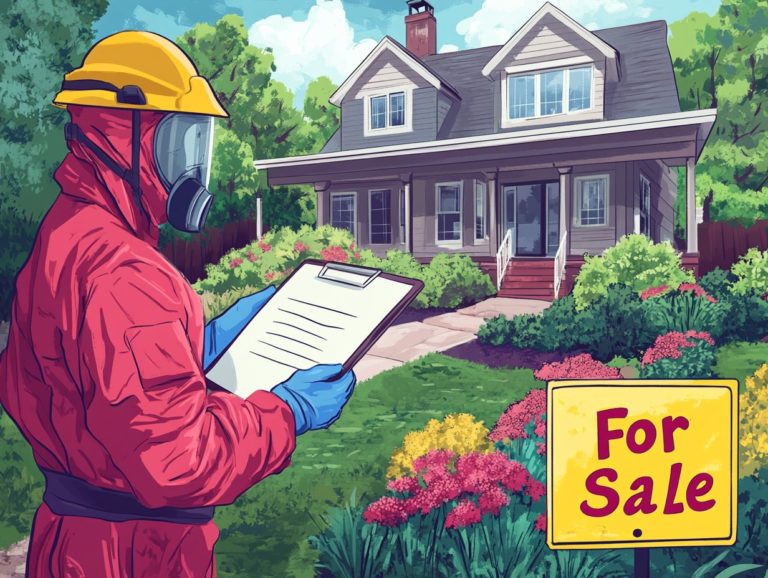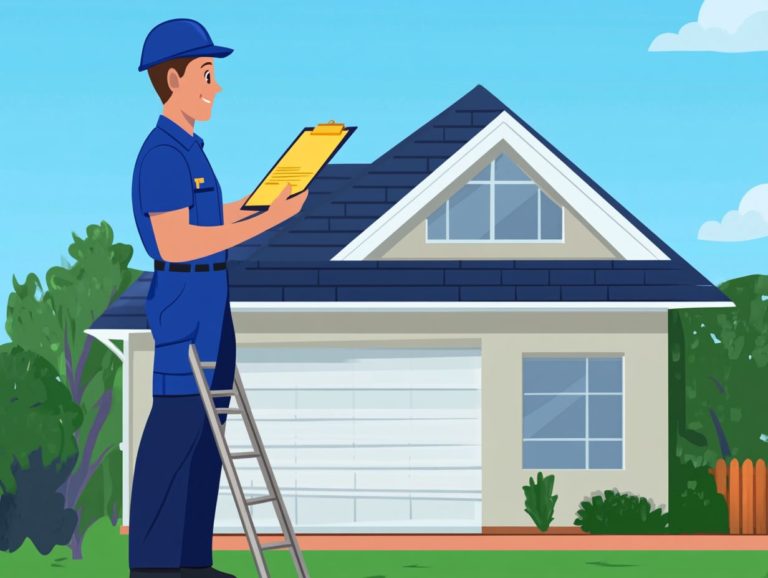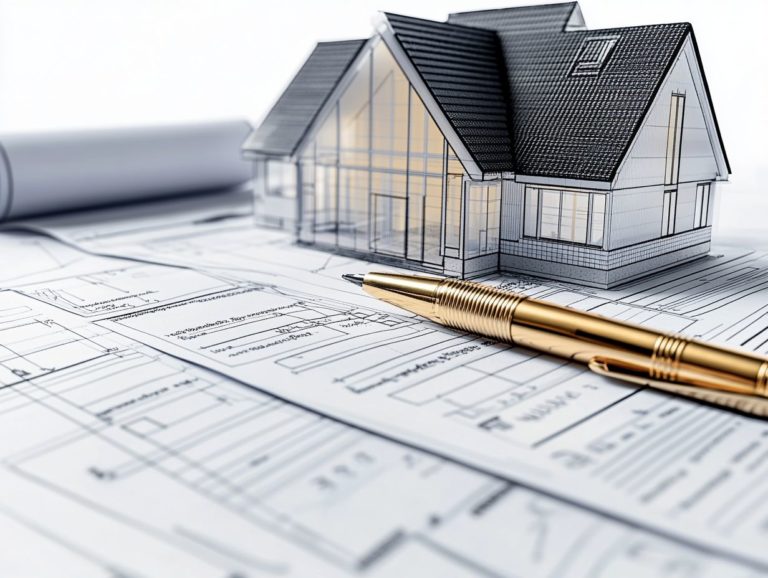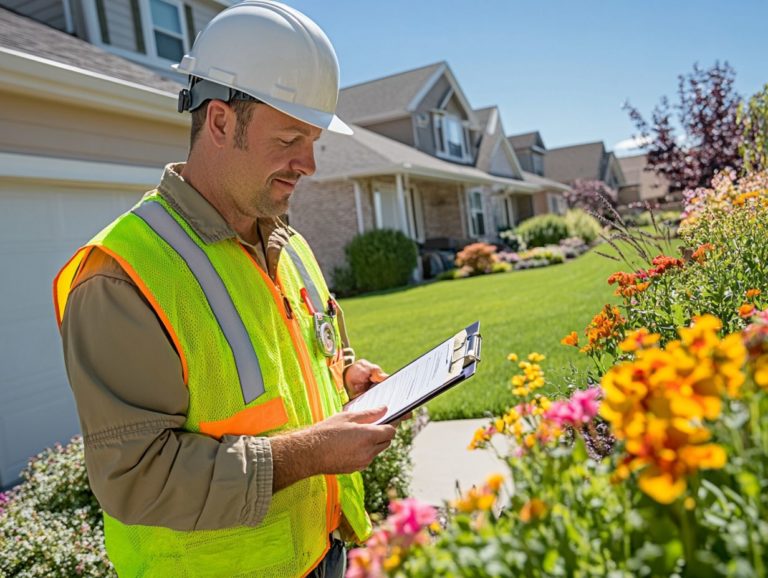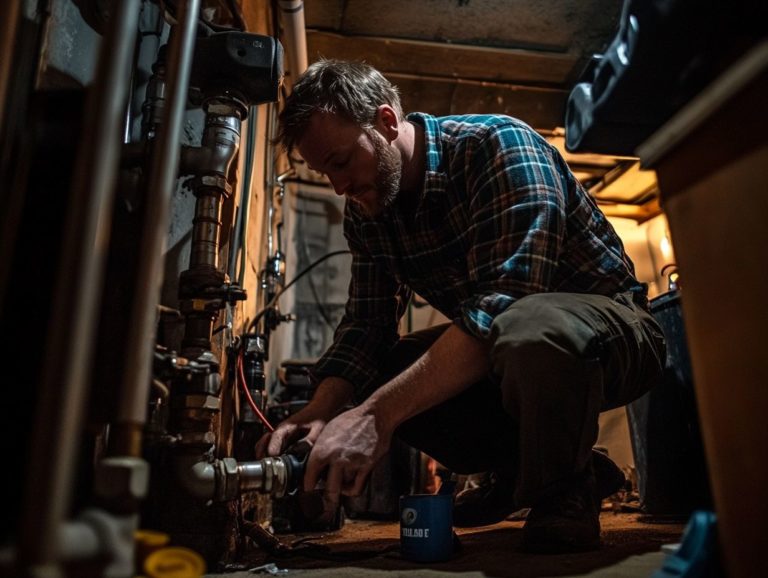How to Choose the Right Home Inspector for Your Property
When you navigate the world of real estate, understanding the vital role of a home inspector can truly make all the difference.
This guide equips you with insights on what to expect during a home inspection and the essential qualities to seek in an inspector.
You ll also discover how to prepare for the inspection, interpret the findings effectively, and take the right steps afterward.
Armed with the right information, you can take charge and ensure your new home is safe and sound.
Contents
- Key Takeaways:
- Understanding the Role of a Home Inspector
- Qualities to Look for in a Home Inspector
- Questions to Ask a Potential Home Inspector
- Factors to Consider When Choosing a Home Inspector
- Preparing for the Home Inspection
- Interpreting the Home Inspection Report
- Next Steps After the Home Inspection
- Frequently Asked Questions
Key Takeaways:

Choose an inspector with experience and relevant certifications to ensure a thorough and accurate inspection.
Effective communication and report writing skills are crucial for a comprehensive and understandable inspection report.
Don t forget to check the cost and read reviews before choosing a home inspector. Be prepared for the inspection by taking necessary steps beforehand.
Understanding the Role of a Home Inspector
Understanding the role of a home inspector is essential as you navigate the buying process. These certified professionals conduct thorough checks to uncover structural concerns and hidden problems that could impact the integrity of the property. Additionally, knowing how to choose the right real estate agent can further assist you in making informed decisions throughout your journey.
A skilled home inspector employs advanced technology to evaluate various systems within the home, including plumbing and electrical systems. This buyer protection measure enables you to make informed decisions and facilitates negotiations for repairs before finalizing your home purchase.
Ultimately, this grants you peace of mind as a homebuyer.
What to Expect from a Home Inspection
A home inspection offers you a thorough evaluation of the property, focusing on critical factors like structural integrity and system problems.
During this essential process, you can anticipate a meticulous investigation of various components, including the roof, plumbing, electrical systems, and HVAC units. Each of these elements plays a crucial role in the home s overall functionality and safety.
The inspector will provide you with a detailed report outlining any issues discovered, which is vital for guiding repair negotiations.
For example, uncovering significant drainage problems or electrical deficiencies could prompt you to request repairs or credits from the seller. This proactive strategy prepares you for future maintenance and helps you make a well-informed decision before committing to such a significant investment.
Qualities to Look for in a Home Inspector
When you’re in the market for a home inspector, it’s crucial to identify specific qualities that guarantee excellent service, as outlined in how to choose the right inspector for your home.
Look for inspectors who are certified by esteemed organizations, such as the American Society of Home Inspectors or the International Association of Certified Home Inspectors. These organizations uphold rigorous accreditation standards, ensuring that you receive the highest level of professionalism and expertise.
Experience and Certifications
Experience and certifications are crucial in determining your home inspector’s ability to deliver top-notch inspection services. Inspectors undergo rigorous training and adhere to established accreditation standards, ensuring they can spot issues that might escape the untrained eye.
This diligence ultimately protects your interests as a prospective buyer.
Certifications from reputable organizations, like the International Association of Certified Home Inspectors (InterNACHI) or the American Society of Home Inspectors (ASHI), highlight an inspector’s dedication to professionalism and continuous education.
By selecting an inspector who has invested in these credentials, you can feel more confident in the thoroughness of the inspection, leading to a more informed purchasing decision and greater peace of mind.
The importance of selecting the right home inspector cannot be overstated. A thorough inspection can save you from future headaches and unexpected costs. To make informed decisions, refer to this guide on how to choose the right inspector for your property. Take action today to ensure that your home-buying experience is as smooth and informed as possible.
Communication and Report Writing Skills
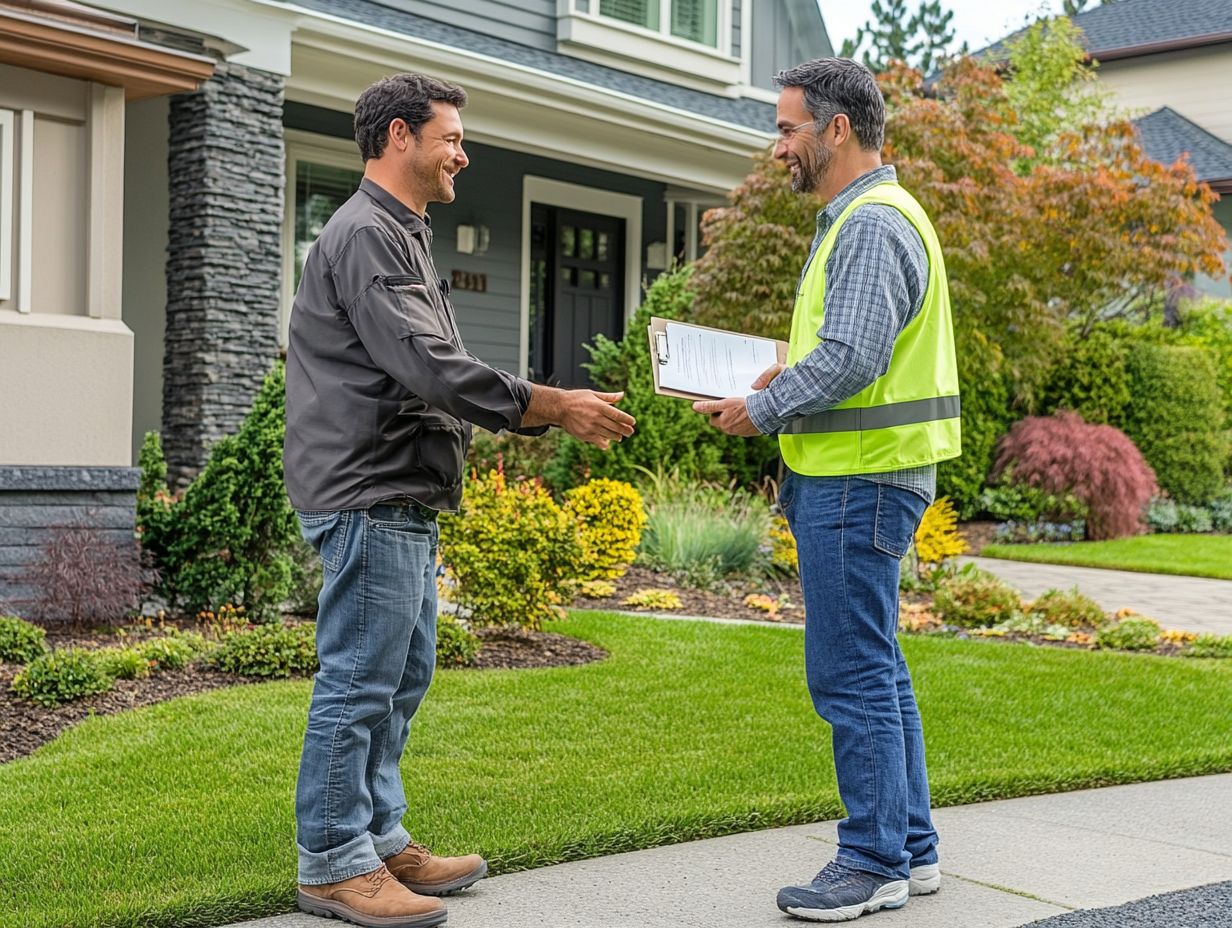
Effective communication and report writing are essential for home inspectors. You must explain your findings clearly and concisely.
This clarity helps clients understand the information and builds trust during the inspection process.
When you present your findings in simple language with visuals, homeowners grasp the issues uncovered. Transparency in reports shows the thoroughness of your inspection, boosting their confidence in you.
Ultimately, effective communication connects your technical knowledge with the homeowner’s decision-making, leading to informed choices and satisfaction.
Questions to Ask a Potential Home Inspector
Asking the right questions is vital when selecting a home inspector. This approach clarifies hiring criteria and helps identify qualified professionals.
Consider their experience and ability to deliver thorough reports. Thoughtful questions lead to informed decisions.
Clarifying Expectations and Services
Clarifying your expectations and the inspection scope is crucial. It lays the groundwork for effective communication.
By knowing what the inspector will cover like the home’s condition and electrical work you reduce confusion and potential misunderstandings. This clarity fosters open dialogue about your concerns.
Factors to Consider When Choosing a Home Inspector
Selecting the right home inspector requires evaluating key factors, such as cost, availability, and reputation.
You can gauge reputation by checking reviews and references from local associations. This ensures a well-informed decision for your investment.
Cost and Availability
Cost and availability are critical factors to consider. Inspection fees vary based on services and the inspector’s experience.
Assess the inspection cost by considering property type, size, and specific issues. For example, older homes may require in-depth assessments, leading to higher fees. Your location also affects costs.
To ensure a fair price, gather quotes from multiple inspectors. This promotes transparency and helps you choose an inspector that meets your needs and budget.
Preparing for the Home Inspection

Preparing for a home inspection is crucial for homebuyers. It involves steps to identify and address potential hidden issues before the inspection.
Thorough preparation can ensure a smooth process and protect your investment.
Steps to Take Before the Inspection
Before the home inspection, take specific steps to prepare effectively. Start by creating a homebuyer checklist that addresses important safety concerns and logistical arrangements. This checklist should cover several key elements.
- First, ensure that pathways are clear so inspectors can access all necessary areas, including the attic, basement, and utility spaces without any obstacles.
- Address obvious safety issues like broken stair railings or exposed wires, as these can raise red flags during the inspection.
- Gather relevant documents, such as previous inspection reports and maintenance records, to provide context for the inspector.
- Schedule the inspection at a time that works well for you to allow for better communication and opportunities to ask questions. This ensures you understand the property’s condition thoroughly.
Interpreting the Home Inspection Report
Interpreting the home inspection report is crucial for you as a buyer. This document reveals essential findings and recommendations that can profoundly influence both your new home’s safety and negotiations for future repairs. Pay careful attention to this step; it can shape your investment in ways you might not have anticipated.
Understanding Key Findings and Recommendations
Understanding the key findings and recommendations within an inspection report is essential for you as a homebuyer. It offers valuable insights into potential structural concerns and necessary repairs. By analyzing these elements, you can identify not just the immediate issues but also their long-term implications.
For example, notes on plumbing or electrical systems can pinpoint areas that might need urgent attention or ongoing maintenance. Being aware of these details helps you prioritize repairs and budget effectively. The recommendations provided act as a strategic roadmap for necessary actions, enabling you to negotiate confidently with sellers.
This analysis helps you make informed decisions and instills a sense of assurance in your home purchasing journey.
Next Steps After the Home Inspection
After a home inspection, carefully assess the next steps to tackle any issues highlighted in the inspection report. Get ready to negotiate smartly with the seller for the best outcome!
Addressing Issues and Negotiating with the Seller
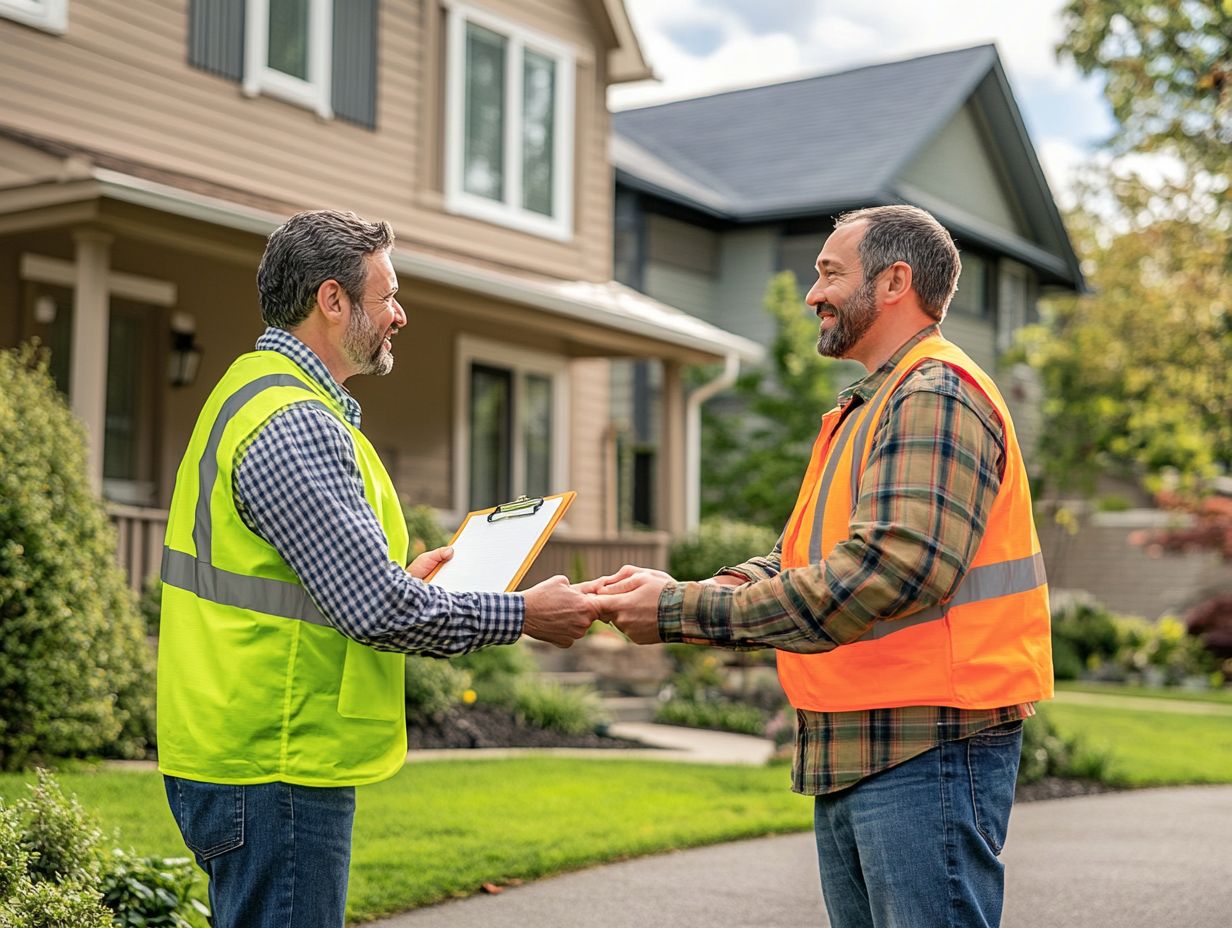
Addressing the issues identified in the home inspection report and negotiating with the seller is a pivotal phase in your home buying journey. This stage demands smart negotiation strategies to ensure fair repair discussions.
Navigating this process effectively protects your investment and cultivates a constructive relationship with the seller. Enter negotiations with a clear grasp of the inspection findings, enabling you to articulate your concerns compellingly.
Documenting the issues meticulously and presenting them clearly can significantly bolster your position. Open communication is key. Express your needs while remaining open to the seller’s perspective.
Finding a balance between being assertive and cooperative can lead to better outcomes for everyone involved, ensuring necessary repairs are addressed without jeopardizing the overall deal.
Frequently Asked Questions
Q1. What is a home inspector and why do I need one?
A home inspector is a professional who examines a property to assess its condition and identify any potential issues, like leaks or unsafe wiring, before you buy a home. It is important to hire a home inspector to ensure that you are aware of any problems with the property before purchasing it.
Q2. What qualifications should I look for in a home inspector?
When choosing a home inspector, make sure they are licensed and certified. Look for experience in the industry, as well as any additional training or specializations they may have. For more guidance, refer to this article on how to choose the right home inspector for you. It is also important to check for reviews or testimonials from previous clients.
Q3. How do I find a reputable home inspector?
Want to find a reputable home inspector? Ask your family, friends, or real estate agents for recommendations! You can also check online for inspectors connected to professional organizations or refer to this guide on how to find a qualified home inspector.
Q4. What should I expect during a home inspection?
What happens during a home inspection? The inspector will check the property s structure, systems, and major components. You’ll get a detailed report highlighting any issues that need fixing!
Q5. Can I attend the home inspection?
Absolutely attend your home inspection! It s your chance to ask questions and learn about the property s condition. A great inspector will also share valuable maintenance tips!
Q6. How much does a home inspection usually cost?
How much should you expect to pay for a home inspection? Prices typically range from $300 to $500, depending on the property s size and location. Remember, a thorough inspection is a smart investment for your future!

